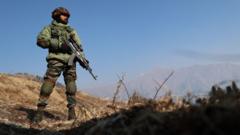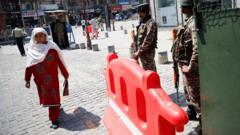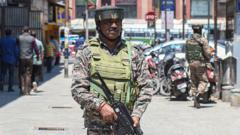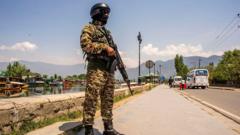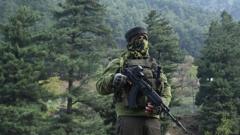A recent investigation by BBC Verify sheds light on the activities of Fadi Gujjar, a notorious people smuggler based in Mauritania, who misled desperate migrants promising safe passage to Europe. The piece tracks the dire consequences of his operations, including the deaths of numerous individuals who fell victim to his deceptive promises.
Exposing the Dark World of Migrant Smuggling in Mauritania
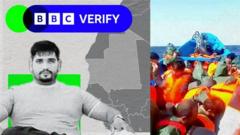
Exposing the Dark World of Migrant Smuggling in Mauritania
Investigating the tragic journey of migrants lured by deceitful smugglers, revealing the harrowing realities that lie behind the statistics.
In January, a tragic incident occurred when a migrant boat was rescued off the north African coast after 14 agonizing days adrift at sea, with roughly 50 lives lost on the perilous journey. Many of these victims were misled by human traffickers assuring them of safe and legal routes into Europe. BBC Verify has meticulously traced one of the traffickers involved, documenting his illicit activities spanning across three continents.
The investigation draws attention to Fadi Gujjar, a Pakistan native who operates within Mauritania and utilizes social media like TikTok to portray a facade of success and camaraderie with fellow smugglers. Despite the deceptive appearance, Gujjar is deeply entrenched in the smuggling crisis, and his online presence serves as both a recruitment tool and a platform for boasting about his exploits.
In January’s tragedy, two of Gujjar’s close friends, Sufian Ali and Atif Shahzad, tragically perished on the journey he sold them under false pretenses. After the incident, he found himself on the run from authorities in Pakistan, hiding under threats of prosecution from local authorities.
Guillaume, the smuggler in question, is identified not just by his numerous online videos showcasing a glamorous lifestyle, but also by the harrowing experiences shared by survivors, many of whom paid large sums for their journey. Reports reveal that Gujjar typically charges approximately $13,000, leading desperate individuals to make risky decisions involving their families’ savings or properties for a shot at a better life.
The smuggling routes utilized are perilous. Migrants often travel from Pakistan through various countries to reach Mauritania, which has become a smuggling hub amid increased clampdowns elsewhere. A stark reality emerges wherein people, driven by hopes of prosperity, are exploited by smugglers like Gujjar, who thrive on their aspirations.
Some survivors spoke of their harrowing boat journey, struggling against starvation, dehydration, and physical abuse by the crew, who were allegedly employed by Gujjar. Ultimately, some were rescued from the brink of death, while many remain undiscovered, presumed dead at sea.
As investigations reveal Gujjar’s ongoing network even post-tragedy, authorities take action against related accomplices, aiming to bring justice to the victims' families. However, the lead smuggler remains elusive, continuing to build his operation amidst the chaos wrought by his actions.
This comprehensive investigation highlights not only the personal tragedies incurred but also points towards deeper systemic issues within global migration patterns, emphasizing the dire need for safer migration routes and stronger international regulations against human trafficking.

